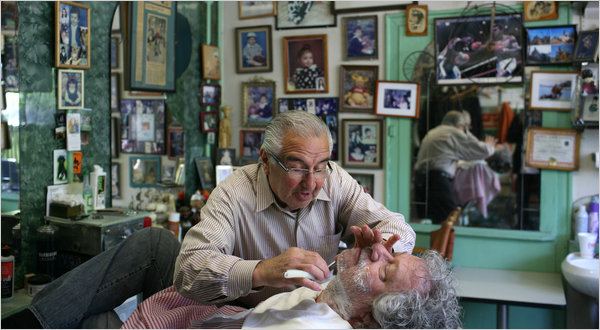A Constant in a Changing Neighborhood Is Endangered

For 60 years, Claudio Caponigro’s hole-in-the-wall barbershop on East 116th Street has been an East Harlem landmark, with generations of men taking turns in one of the shop’s three ancient peppermint-color chairs, receiving his tender ministrations among leather strops and bottles of Jeris hair tonic.
It has become a beloved museum of the old-fashioned barber trade, attracting political leaders, entertainers and underworld bosses who mixed with the neighborhood’s declining corps of Italian men, as well as the generations of Puerto Rican and other Latino men who have displaced them.
Even the price he charges is antique — $10 a haircut.
But now the rental pressures of a gentrifying neighborhood are threatening to close his shop, which along with Rao’s celebrity-packed restaurant, is one of the last relics of Italian East Harlem. The building was sold a year ago, and he has been staying month-to-month without a lease. But he recently received a vacate order from his new landlord, ordering him out by May 31.
Mr. Caponigro, 80, has retained a lawyer to help him as he tries to stay for at least another year. “I want a little time,” he said. “This is my happiness. My customers cry when they find out I’m going out.”
“God gave me health,” he said, his voice sturdy, even effervescent. “I’m still in good shape. I’m still strong. I’m still a good barber, and the customers keep coming back.”
The customers having their hair cut on Thursday morning, or waiting their turn in weathered armchairs, were lavish in expressions of support. Elliot Clark, 65, a plumbing contractor, stops in every Thursday morning for a straight-razor shave.
“It’s the most relaxing 20 minutes I have during the week,” he said. “It would be very upsetting if he were to close.”
Mr. Caponigro said the landlord, Hong Kai Lin Realty, told him that he could stay only if he agreed to a rent of $1,650, almost triple what he is now paying.
The 15-by-15-foot space, the landlord told him, might be turned into a takeout Chinese restaurant. Yat T. Man, a lawyer for the landlord, said his client was a “mom-and-pop landlord, not a Donald Trump,” and could not afford to keep Mr. Caponigro so far below the market rate.
“If he wants to negotiate he should call me,” Mr. Man said.
The barbershop has been there since World War I. Mr. Caponigro started working in it in the early 1950s, as a fresh immigrant from Salerno, Italy, commanding the second of three chairs, the chair he still favors. He took over the business a decade later.
These days, he drives from his home in the northeast Bronx and opens his shop, with its faded barber pole, and prepares his scissors and other instruments. He has never installed a telephone — a call would interfere with a haircut’s solemn ritual. His wife, Julia, and his three daughters used to reach him by calling the Morrone bakery nearby, but that, too, has been shuttered.
His guiding principle seems to be loyalty, and he repeatedly boasts how faithful his customers have been. He cut the hair of Robert Rodriguez, a former city councilman who died in 1994, and also cut the hair of his young son, Robert J. Rodriguez. The son is now 35 and a state assemblyman.
“He’s been a staple in this community in terms of reflecting what East Harlem was and its ability to change,” Mr. Rodriguez said. “To get the latest news of what’s happening in the area, I go to Claudio.”
Loyalty has sometimes gotten Mr. Caponigro in trouble. Five years ago, he was indicted, along with dozens of other defendants, in a racketeering investigation. The charges against him stemmed from his refusal of a request by F.B.I. agents to identify photographs of Genovese crime family members who supposedly patronized his shop. The indictment identified him as Claudio the Barber, which is what everyone in the neighborhood, grown-up and child, has always called him. Mr. Caponigro, who ended up on probation, does not deny that he has trimmed the hair of more than a few wise guys.
“If you’re my customer, I don’t ask what you do for a living,” he said. “I had quite a few beautiful people. Once in a while you see them in the papers.”
Mr. Caponigro prefers to talk about a plaque given to him by Luis and Grace Gonzalez. They were among “the poor people of Puerto Rico” — he sometimes calls them “the Spanish people” — who adopted his shop in the 1950s.
“They have such loyalty with me,” he said of the Gonzalezes. “They move to Pennsylvania and they still come in. I take care of three generations.”